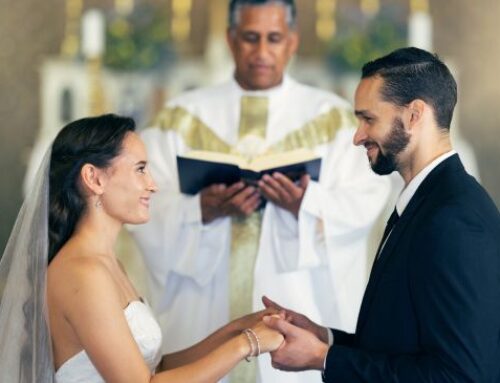Harley Price
 It tells you something about the times that when you Google “Jesus Christ” one of the first suggestions that pops up in the auto-fill menu is “Jesus Christ Superstar.” As a ubiquitous phenomenon of popular modern culture, the Andrew Lloyd Webber musical has been one of the most effective forces for the infantilization of the Western mind of the past half-century, and it is entirely typical that, after “Joseph and his Technicolor Dream-Coat,” Webber’s second blockbuster hit amounted to a vocalized version of The Idiot’s Guide to Christology.
It tells you something about the times that when you Google “Jesus Christ” one of the first suggestions that pops up in the auto-fill menu is “Jesus Christ Superstar.” As a ubiquitous phenomenon of popular modern culture, the Andrew Lloyd Webber musical has been one of the most effective forces for the infantilization of the Western mind of the past half-century, and it is entirely typical that, after “Joseph and his Technicolor Dream-Coat,” Webber’s second blockbuster hit amounted to a vocalized version of The Idiot’s Guide to Christology.
Like other liberals in the early 1970s, in “Jesus Christ Superstar,” Webber essayed to redeem Our Lord as a revolutionary hero, along the lines of those other revolutionary heroes (Mao, Che, Fidel) on whom so many of the leftist intellectuals of the period were developing their incurable schoolboy crushes. But then an “intellectual,” as has often been observed, is someone who is so lacking in intelligence as to credit what everyone else knows to be preposterous nonsense.
To be sure, Jesus was an audacious revolutionary—a revolutionary revolutionary—in that he refused to be a run-of-the-mill political one. The greatest threat he posed to the State was that, unlike other revolutionaries before or since, he insouciantly ignored it.
When the Pharisees scoffed at Jesus’ claims to be the Messiah, asking, “When will the Kingdom of God arrive,” he replied: “The Kingdom of God cometh not with observation: Neither shall they say, Lo here! or, lo there! for, behold, the kingdom of God is within you.” Jesus, we should remember, promised only to redeem the individual from sin, not the socio-political order from inequality and injustice. He said nothing about raising the minimum wage, making the rich pay, guaranteeing the equality of women and “gays,” promoting diversity at the Sanhedrin, making abortion and contraception universally accessible, normalizing homosexuality, blessing same-sex “marriage,” or recognizing the demand of the non-binary gendered to be called by pronouns of their own invention. (He wasn’t even interested in criticizing Roman colonial “hegemonism.”) On these and all the other serial obsessions of progressives, Jesus remained a radical and contented conservative.
It must be astounding to a modern politician that Jesus promised to redress not a single instance of political injustice, economic inequality, or racial prejudice. He nowhere champions, nor even identifies, any interest group smaller than the totality of mankind, or larger than the family. Amongst the blessed, he names the poor in spirit, not the poor; those who hunger and thirst after righteousness, not those who hunger and thirst. His predicatorial categories are invariably ethical, rather than ethnological; he condemns sexual vices but never talks about the sexes; he extols the engendering of virtues in the soul and children in the home, but has no theory of gender. Note that he drives the money-changers out of the temple, not because he has anything against wealth or commercial exchange, but because they have violated the sanctity of the House of God. (Again, he was more indignant about theological “occupations” than merely political ones.) Wherever he encounters them, he is offensively and unapologetically judgmental in condemning individual moral wrongs, while saying not a word about collective rights or entitlements.
In the Aquarian ‘60s, when Jesus was inducted into the hippie hall of fame, the inference of a shared metaphysical consciousness was drawn on the slender evidence that he had long hair and wore sandals. It can be due only to their opacity (or mendacity) that Jesus has been appropriated as a prophet avant le mot by the adherents of practically every progressive movement—socialism, pacifism, liberation theology, feminism, free love, flower power, Black Power, Occupy Wall Street, even homosexual “rights”—of the past two centuries, to all of whom, were he in the flesh today, he would simply say, “Go and sin no more.” The only group that is not permitted to invoke the teachings of Jesus in the service of political or social change is the community of Christians themselves, who, when they do so, are denounced as “bigots,” “theocrats,” gap-toothed rubes who “cling to their guns and religion,” and are lectured gravely on the separation of Church and State.
As G.K. Chesterton observed nearly a century ago, “Religious liberty might be supposed to mean that everybody is free to discuss religion. In practice it means that hardly anybody is allowed to mention it.” Since then, the foundational democratic right of freedom of religion has devolved into a fastidious freedom from religion. In Canada, the ruling Liberal Party—the party of “diversity, tolerance, and inclusion,” remember—has forbidden any of its members from raising questions about the current legal regime on abortion, same-sex “marriage,” transgenderism, or any other of the myriad legislative insults to the ancient moral credenda of Christians, Muslims, or Jews; and the official Conservative opposition has been content to collude with them in a conspiracy of silence.
As a signal illustration of Chesterton’s paradox, it’s worth recalling the 2017 disqualification of MP Rachel Harder from the position of Chair of the Committee on the Status of Women, which was as instructive in the way in which the Conservatives defended, as the way in which the Liberals maligned, her.
Naturally, it did not take long for world-class boy-feminist Justin Trudeau to remonstrate that, because of her pro-life views, Harder could not protect the “rights of women,” or even represent them. Really? As polls then indicated, and continue to indicate, between 60 and 70 per cent of Canadian women are supportive of at least some restrictions on Canada’s completely unfettered abortion regime. In Canada at present, the disposal of household waste at the local rubbish tip is subject to more stringent government regulations than that of a healthy fetus at an abortion mill. But then in Canada at present, on any issue in which a social-conservative majority is “out of step” with a progressive minority, the political class feels an obligation to “represent” only the latter. That’s what progressives mean whenever they say that they are firmly “in the mainstream.”
The former Conservative leader Andrew Scheer’s pusillanimous response to this unprecedented usurpation of the opposition party’s procedural right was to reassure the usurpers that the Conservatives have “no intention of opening up debate” on abortion, and that Harder could “do a good job in spite of her personal views.” In spite? What else do legislators bring to bear on their political deliberations besides their personal views? Their impersonal views? Other people’s personal views? Where does it say in Canada’s constitution that Christians and conservatives are condemned to hypocrisy while only liberals enjoy the exemption of being sincere?
It has never been incumbent upon liberals to define what they mean by “personal views,” except that, to them, traditional religious beliefs seem always to be fatally “personal,” even though there ought to be no reason why a political opinion that happens to coincide with a religious doctrine should be ipso facto disqualified. The Christian moral teaching on homosexuality also happens to coincide with the teachings of the ancient Platonists and Stoics, but no one would disqualify it because it was “philosophical.” No one would say that a modern legislator must never let his “personal view” of this or that influence his public decisions in government because he was an Empiricist or a Utilitarian. No one would say—did say—that Pierre Trudeau’s personal views on the economy should be disqualified because he was a naively doctrinaire Socialist, or that his son’s personal views on abortion should be disqualified because he identifies himself, proudly, and whenever he can, as a feminist.
The moral doctrines of religion and the moral doctrines of philosophy often coincide inasmuch as both are independently and eminently rational. There are reasons to be opposed to abortion or transgenderism that are entirely sui generis and autonomous of religious revelation. Moreover, it need hardly be said that ideological enthusiasms can often be quite as irrational as religious ones. No one today would say that the Marxist shibboleths to which so many “intellectuals” (including Pierre Trudeau) once subscribed were rational. And some might even say that the belief (to which Justin Trudeau subscribes) that a man is a woman merely because he thinks he is, is quite as fideistic and irrational as the Christian dogma of Transubstantiation.
The fetishists of the separation of Church and State have, moreover, never demonstrated why an appeal to transcendence is inapposite in the public square. Must anyone who has an opinion on the Government of the Cosmos be discounted when he opines on the government of the nation? According to this way of thinking, Cicero should have had nothing to say about Roman law because of his invocation of the eternal and immutable Law of Nature; and Diotima’s exhortation to the higher mysteries of love ought to have debarred her from commenting on the lower. Judging the truth of things by a Higher Standard has always been the first principle of any rational and universal epistemology. Since the age of Pythagoras, it has been understood that the approximate straightness of a wooden ruler must be measured by the standard of the purely metaphysical conception of a line; and experience shows that rulers of flesh and blood—rulers of nations—are generally more crooked than rulers of wood.
In any case, religious believers might be somewhat less touchy about being constantly admonished to keep their retrograde opinions on abortion or homosexuality in the closet—as a matter of “personal” belief—if the State felt a reciprocal compunction about imposing its own transient orthodoxies on the community of the Christian faithful. In Ontario the latter were (almost) getting used to the idea of the schools indoctrinating their children into the normalcy of homosexuality and inviting little Johnnie to question whether he might in fact be a little Jenny, when along comes the federal injunction against “conversion therapy,” making it a criminal offense, punishable by five years in prison, for a parent to do anything other than “affirm” his own prepubescent child’s aberrant homosexual or gender-dysphoric fantasies. Forget the sequestration of “personal” religious beliefs from the public square. Christians may no longer exercise their personal religious beliefs even in the privacy of their own homes. The State, which was famously declared by the father of Canada’s current Prime Minister to have “no business in the bedrooms of the nation,” is now barging into its nurseries—a depressingly ancient and recurrent pattern, if you remember anything about the nativity-narrative of the Divine Child.
Over the past decade in Canada, the State’s assaults upon religious liberty and incursions into the private sphere of religious life have begun to reach Diocletian proportions: Christian business owners compelled, under pain of fine or incarceration, to concelebrate same-sex “marriages”; Christian parents compelled, under pain of fine or incarceration, to submit their charges to the tender mercies of the provinces’ sex and gender re-education curricula; anti-abortion protestors excluded, on pain of fine or incarceration—as opposed, that is, to “antifa,” anti-Big Oil, anti-Wall Street, anti-G7, or Black Lives Matter protestors—from ever-expanding abortuary “bubble zones.” (As I suggested recently, if abortion protestors would only put down their rosaries and take up signs reading Black Lives Matter, don balaclavas and hoodies, smash a few windows and torch a few police cars, the bubble zones would quickly disappear.)
We are all grateful, of course, that the State no longer establishes an official religion, and that all religious creeds are now recognized as equal. But we should be less than completely grateful that all religious creeds are equal only in that legislators and citizens are permitted to profess and live their lives in accordance with none of them.
On the other hand, when the current laws on abortion, same-sex “marriage,” homosexual and transgender “rights,” and so on, have achieved such sacrosanctity that no one in government may question them; when citizens who do so are subject to public shaming and judicial penalty; and when the State demands that parents and teachers, in violation of their own religious conscience, evangelize its dogmas on sexuality, gender, and the family to captive children at home and in school, we have regressed to what can only be described as the Establishment of Religion. We have allowed the State to impose upon its citizens a single and exclusive orthodoxy, dissent from which is proscribed, just as heresy was once proscribed in the Christian Middle Ages.
Harley Price is the author of Give Speech a Chance Heretical Essays on What You Can’t Say or Even Think, in which a version of this essay appears.




